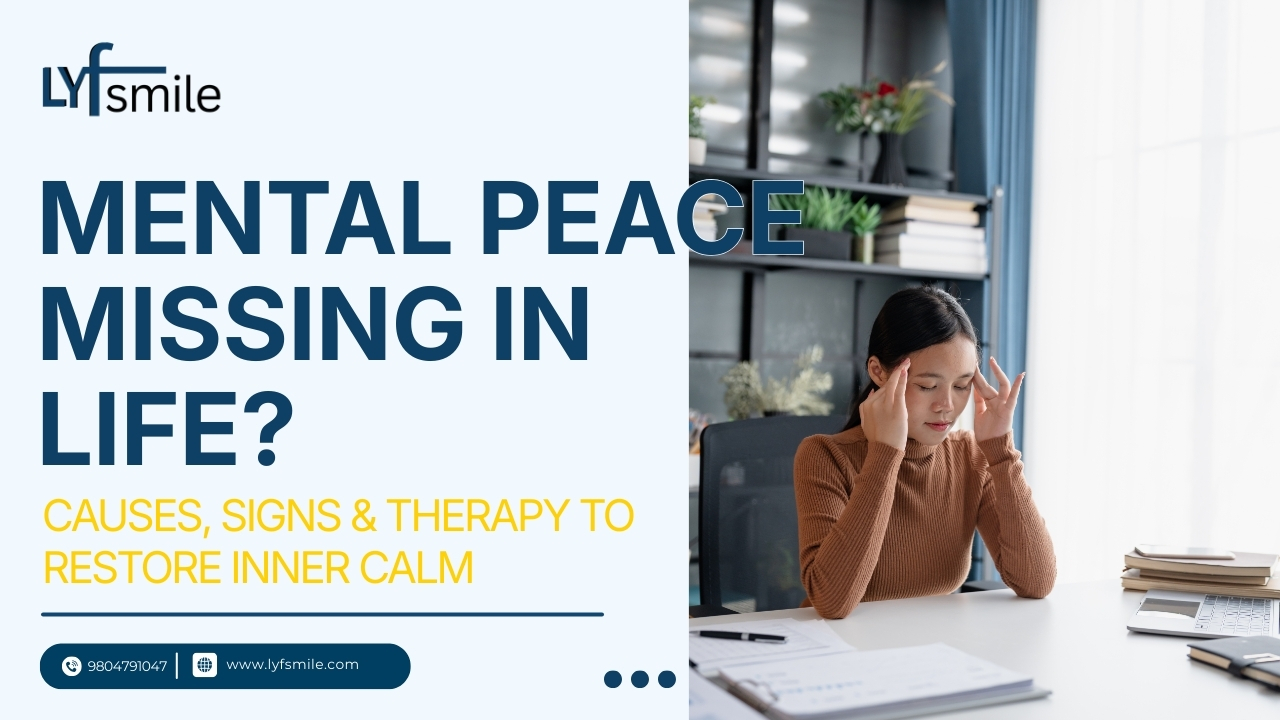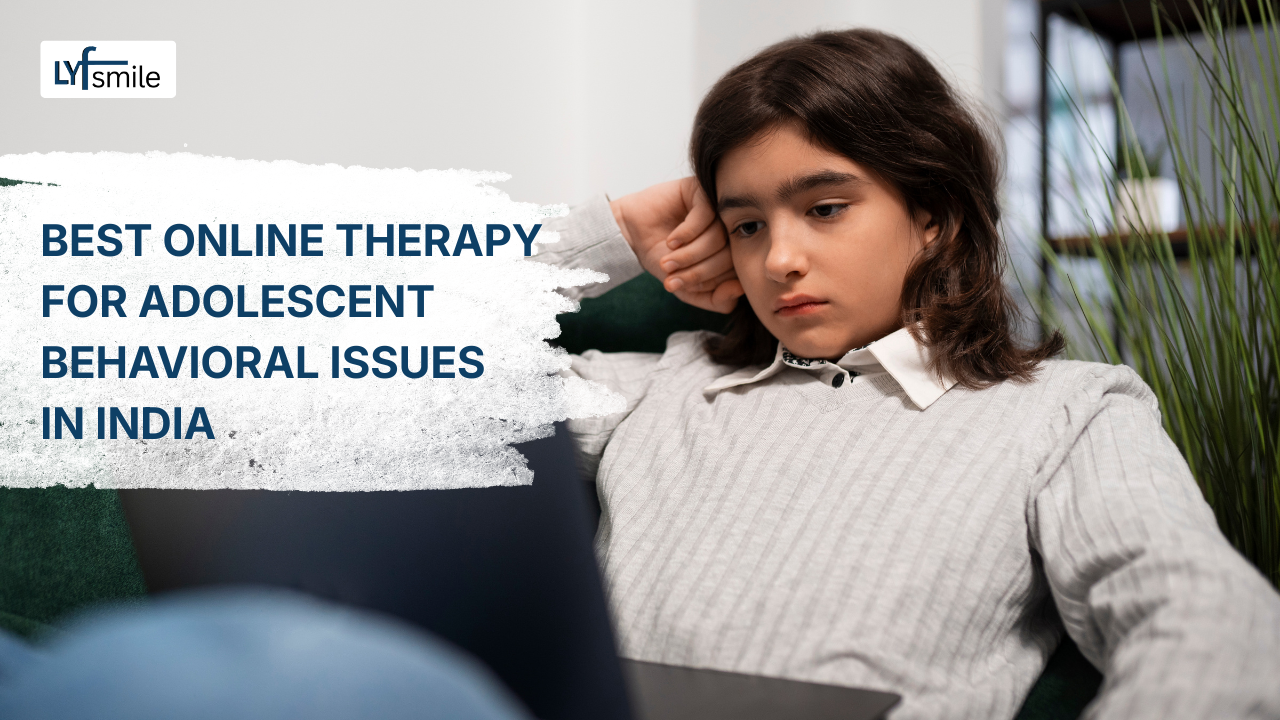
Lakshika Kaushik
Coping with Death: A Gentle Guide to Healing After Loss
Losing someone you love is one of the deepest pains. The silence feels heavier, everything reminds you of them, and even breathing feels different. You wake up hoping it was just a dream, but it’s real.
Grief isn’t just sadness—it’s a mix of emotions that come in waves: guilt, anger, disbelief, fear, and exhaustion. Thoughts like
“I still can’t believe they’re gone.”
“I feel guilty for living.”
“Everything reminds me of them.”
“I’m afraid the pain will never end.”
These are inner feelings shared by almost everyone coping with death. But while grief is universal, no two journeys are alike.
At Lyfsmile, Gurgaon’s most trusted emotional wellness space, therapists often say, “You can’t ‘fix’ grief, but you can walk through it gently.” Healing doesn’t mean forgetting the person; it means remembering with peace.
Death can trigger loss depression, grief anxiety, and unresolved grief symptoms that make it hard to function. Some people withdraw completely; others bury themselves in work. Whatever your way—it’s valid. What matters is that you don’t walk this path alone.
Lyfsmile helps you start with a free 10–15 minute counseling session, giving you a safe space to simply talk about your feelings—no pressure, no judgment, just presence.
The Psychology of Grief—What Really Happens Inside You

When learning about healing after loss, it helps to understand what’s happening inside your mind and body. Grief isn’t only emotional—it’s biological and psychological.
When you lose someone, your brain’s reward and attachment centers—the ones tied to that person—go into withdrawal. You literally ache for their presence. This leads to:
Sleepless nights
Loss of appetite
Brain fog
Intense emotional ups and downs
These are natural reactions, but when they persist for months or years, it can become complicated grief. You might find yourself stuck in the past, unable to find joy in the present.
This is why recovering from loss and maintaining mental health must go hand in hand. Ignoring emotions doesn’t make them disappear—it only buries them deeper. Therapy gives you space to express what your heart can’t say out loud.
Lyfsmile’s approach to grief therapy includes:
Talking through memories and regrets
Identifying patterns of guilt and emotional avoidance
Mindfulness-based emotional regulation
Gentle self-compassion exercises
Healing starts with awareness. Once you understand what’s happening, you can begin to guide your emotions—instead of being consumed by them.
Recognizing When Grief Turns Complicated

Not all grief heals on its own. Sometimes, it stays—heavy, invisible, and constant. You may stop crying, but the emptiness doesn’t fade. This is called complicated grief, and it can evolve into loss depression or chronic grief anxiety.
Here are some signs of unresolved grief symptoms to watch for:
Feeling emotionally numb or disconnected from reality
Constant guilt or self-blame
Avoiding reminders of your loved one
Inability to find joy or motivation
Intense longing that never eases
If these resonate with you, know that it doesn’t mean you’re broken—it means your pain needs gentle help to move again. Dealing with loss becomes especially hard when emotions stay stuck, but therapy can help release what feels trapped inside.
At Lyfsmile, therapists specialize in helping people recognize these emotional patterns. Through guided conversations, breathing techniques, and personalized therapy plans, they help you reconnect with life—without losing the bond you had with your loved one.
Many clients describe therapy as a moment where the fog finally starts to lift.
You don’t forget—you simply start to see light again.
And you can begin that healing process right now with Lyfsmile’s free 15-minute grief counseling call—a small yet powerful step toward clarity, comfort, and emotional renewal.
Coping with Death: 7 Gentle Steps to Begin Healing

Healing after loss is never linear. Some days you’ll cry; others you’ll smile unexpectedly—both are signs that you’re slowly moving forward. If you’re struggling with coping with death, here are seven compassionate steps to help you heal gently and begin rebuilding life:
1. Allow Yourself to Feel Everything
Grief isn’t a problem to solve—it’s an experience to live through. Cry when you need to, talk when you can, and rest when you must. Every emotion is valid and part of the process of coping with death.
2. Don’t Isolate Yourself
Even if no one fully understands your pain, being around safe, caring people can make breathing a little easier. Lyfsmile’s supportive community of therapists and counseling groups offers a space where you don’t have to explain—just feel and heal.
3. Rebuild Your Daily Structure
When you lose someone, days can blur together. Creating small, steady routines—morning walks, journaling, or eating on time—helps re-anchor your life and ease grief anxiety while coping with death.
4. Keep Their Memory Alive
Healing doesn’t mean forgetting—it means holding on differently. You can write letters to them, plant a tree in their memory, or share stories that keep their spirit alive. Such gentle rituals help transform pain into remembrance.
5. Be Kind to Your Mind and Body
Grief is exhausting—emotionally and physically. Sleep, hydration, movement, and nourishment are vital when coping with death. Taking care of your body helps your mind process pain more calmly.
6. Seek Therapy When the Pain Feels Stuck
If your emotions keep looping endlessly, professional help can make a difference. Lyfsmile’s therapists in Gurgaon specialize in identifying unresolved grief symptoms, helping you release what feels heavy through evidence-based therapy and compassionate listening.
7. Take the First Step—Even if It’s Small
Healing begins with one simple action—like booking that first counseling call. A free 10–15 minute session at Lyfsmile could become the moment where your journey toward peace truly begins.
Why Therapy Helps When Nothing Else Does
People often ask, “Can therapy really help with coping with death?”
The answer—absolutely, yes.
Grief counseling in Gurgaon doesn’t erase memories; it helps you build emotional balance so you can remember without breaking down. Therapy teaches you to regulate painful emotions, express guilt healthily, and rebuild your inner strength—all essential parts of coping with death in a healthy way.
At Lyfsmile, therapy is not just about surviving loss—it’s about rediscovering life and learning to smile again.
Here’s what makes Lyfsmile Gurgaon’s most trusted emotional wellness organization for those coping with death, grief, or deep emotional pain:
Free 10–15 Minute Consultation
Try therapy with zero pressure. Talk to an expert, share your story, and see how support feels before continuing your journey.
Specialists in Grief, Loss & Depression
Our licensed therapists deeply understand the emotional and biological layers of complicated grief, grief anxiety, and loss depression—offering strategies tailored for coping with death and emotional healing.
Online & In-Person Sessions
Whether you prefer comfort at home or a face-to-face session, Lyfsmile offers both—making therapy accessible anywhere in Gurgaon and beyond.
Therapy That Feels Human
Each session combines empathy with science—mindfulness, journaling, emotion mapping, and gentle conversation—all designed to help you process pain and find calm while coping with death.
Personalized Healing Plans
Every person’s grief is unique. Lyfsmile creates custom therapy plans that match your emotions, pace, and goals—ensuring your healing feels personal and sustainable.
Because at Lyfsmile, we don’t just help you survive the pain of loss—we help you live again, one gentle step at a time.
Grief Counseling in Gurgaon: Heal Gently with Lyfsmile Therapists

Struggling with coping with death or feeling trapped in unresolved grief?
You’re not alone—and you don’t have to go through it in silence.
At Lyfsmile, our trained therapists in Gurgaon help you gently process emotions like guilt, emptiness, and grief anxiety with compassion and professional care. Whether your pain feels fresh or years old, therapy gives you a safe, judgment-free space to release it.
You can begin with a free 10–15 minute counseling session, where you simply talk, share, and breathe—no pressure to commit, just a chance to be heard.
Lyfsmile’s approach to grief counseling in Gurgaon blends empathy with evidence-based science, helping you:
Rebuild emotional strength after loss
Ease anxiety, guilt, and emotional fatigue
Find peace while keeping your loved one’s memory alive
Learn healthy ways of dealing with loss without losing yourself.
Every story of loss is unique—and so is the path to healing.
With Lyfsmile’s support, you can rediscover calm, hope, and connection—one gentle session at a time.
Final Verdict: Finding Light Beyond Loss
One day, you’ll laugh again—not because the pain is gone, but because love has changed shape.
Learning how to cope with death means giving yourself permission to live, even while remembering. You may always miss them, but you’ll also carry them in how you love, help, and heal.
With time, therapy, and self-compassion, the heart slowly makes peace with what the mind cannot understand.
At Lyfsmile, we believe that even after the deepest loss, healing is possible. Our experienced therapists in Gurgaon have helped hundreds of people move from darkness to calm, from despair to gentle acceptance.
If you’ve been thinking, “I don’t know how to be happy again,” take one small step today.
Book your free 15-minute counseling session with Lyfsmile’s trusted grief therapists—and begin your journey from pain toward peace.
Because your story doesn’t end with loss—it begins again with healing.
FAQs
1. How to move on after losing someone?
Moving on doesn’t mean forgetting. Start by accepting your emotions and giving yourself time to grieve. Talking to a professional through grief counseling in Gurgaon at Lyfsmile can help you process the pain, find closure, and rebuild life at your own pace.
2. Why does grief cause anxiety?
Grief can trigger anxiety because loss shakes your sense of safety and control. You may fear more loss or feel constant restlessness. Therapists in Gurgaon at Lyfsmile help identify these emotional triggers and teach coping tools to manage grief and anxiety effectively.
3. How long does grief depression last?
There’s no fixed timeline—for some, grief eases in months; for others, it lingers longer, especially if it becomes complicated grief. If you’ve been feeling low or detached for weeks, Lyfsmile’s grief therapy in Gurgaon can guide you toward gentle recovery.
4. How to cope with loss and anxiety?
Stay connected, practice self-care, and seek emotional support. Combining mindfulness with professional help through grief counseling in Gurgaon can ease both depression and anxiety from loss, helping you regain emotional balance.
5. Is it normal to feel stuck after loss?
Yes, feeling emotionally stuck is common—it’s part of mourning mental health. But if the feeling persists, it may signal unresolved grief symptoms. Lyfsmile’s expert counselors in Gurgaon can help you understand these emotions and move forward gently.
6. What is the healthiest way to deal with loss?
The healthiest way to deal with loss is to allow yourself to feel every emotion—sadness, anger, and confusion—without judgment. Talk about your feelings, lean on supportive people, and consider grief counseling in Gurgaon through Lyfsmile, where professional therapists help you process emotions and begin to heal with compassion.
7. How long does it take to heal after losing someone?
There’s no fixed timeline for healing after loss—everyone’s journey is different. Some start to feel lighter within months, while others may take years. If your pain feels stuck or overwhelming, Lyfsmile’s grief therapy can help you find emotional balance, gentle acceptance, and renewed peace.
8. When should I seek professional help for grief?
If your pain feels stuck—like you can’t sleep, focus, or feel joy for weeks—it may be time to reach out. Grief counseling in Gurgaon at Lyfsmile provides safe, guided support to manage grief anxiety, loss depression, and unresolved grief symptoms effectively.
9. What are the main symptoms of depression?
Depression often shows up as loss of interest, constant fatigue, sadness, irritability, and withdrawal from people or hobbies. You might feel empty inside or struggle to focus. If these signs last more than two weeks, it may be time to seek therapy or depression counseling in Gurgaon at Lyfsmile for early support.








